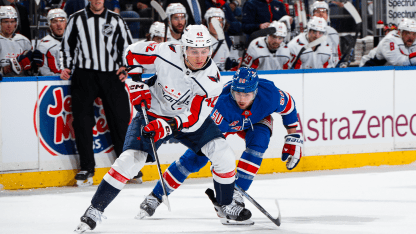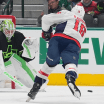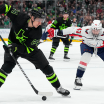New York scored three times in the front half of the second period on Sunday afternoon at Madison Square Garden, and it proved to be enough to take Game 1 of the first-round series between the Caps and Rangers, 4-1. Four different New York goal scorers supported a 20-save effort from Igor Shesterkin in the Rangers’ crease.
Including the last 11 games of the regular season, the Cap have now been held to two or fewer goals scored in 11 of their last 12 games, winning four of them.
“We’ve got to do a way better job offensively; it’s no secret, we struggled all year,” says Caps’ coach Spencer Carbery. “But we’ve got to create more on the interior, we’ve got to skate out of pressure, we’ve got to keep pucks off the yellow. We continue to just rim pucks around; we’ve got to do a better job offensively.”
A few days ago after a Washington practice, Carbery noted the importance of keeping as much of this series at 5-on-5 as possible, given the Rangers’ prowess on both special teams. The first period sent those hopes out the window right away; each team had a pair of power plays, and another two minutes was played at 4-on-4. Only 10 minutes of the first frame were played at 5-on-5, and the Rangers held a 2-1 edge in even-strength shots on net.
On one of those New York power plays, Caps’ goaltender Charlie Lindgren made an excellent read and moved laterally to deny a Mika Zibanejad one-timer from the left dot.
Despite all the special teams time, the first period was scoreless. Because of all the special teams time, rookie Caps’ defenseman Vincent Iorio – making his Stanley Cup playoff debut – logged only two first-period shifts totaling 1:17; he was the skater with the lowest ice time on either side in the first.
The Rangers seized control of the contest with a trio of tallies just 126 seconds apart in the front half of the middle frame.
Matt Rempe started the scoring spree at 4:17 of the second, chipping a shot home from just above the paint off the left post.
A mere 33 seconds later, the Rangers doubled their lead. Alexis Lafreniere forced a turnover when he rubbed out Iorio hard into the left half wall in the Caps’ end, and Artemi Panarin scored on a wrist shot from the right dot a couple of quick passes later. This occurred on Iorio’s third shift of the game, and his first of the second period. He left the game with an upper body injury and did not return.
“It was close; it was borderline,” says Carbery of the hit on Iorio. “Young player, I feel bad for him because he puts himself in a tough spot; he probably needs to move the puck quicker there, or just get it out of his hands. And then he hangs onto it or bobbles it.”
On the face-off immediately following the first television timeout of the middle frame, New York pivot Barclay Goodrow won a right dot draw to Jimmy Vesey, whose shot from the high slot found purchase behind Lindgren at 6:23, increasing the New York lead to 3-0. Vesey’s goal was the second of the day from New York’s opportunistic fourth line; the three players on that unit swept the game’s three stars.
On the Vesey goal, Caps’ winger Beck Malenstyn went down almost instantly after he got tangled up with Rempe off the draw. Malenstyn did return and seemed none the worse for wear thereafter.
Washington was able to get one of those goals back just over a minute after the Vesey goal. The Caps did a good job of working the puck around the lower perimeter of the New York end, and with Martin Fehervary driving down toward the slot, Tom Wilson threw it to the front, and Fehervary deflected it home, making it a 3-1 contest at 7:31 of the second.
“I see an opportunity to go to the net,” recounts Fehervary. “And you never know; whenever the puck is going to the net, good things happen usually. I went there and I don’t even know if it hit me – it felt like it hit me – and it ended up in the net, so I’m really happy for that. We need to do this more, getting to the net, getting to their paint, and being kind of mean there.”
The Caps had the second period’s only power play, and it came after the Fehervary goal. But Washington wasn’t able to pull any closer with the man advantage, nor could it do so on its fourth manpower advantage of the evening in the third period. Caps’ captain Alex Ovechkin was held without a shot on goal for the first time in a playoff game since May 3, 2018. He did tee up seven attempts, but five were blocked, and two missed the mark.
“Entries were a massive issue, as everybody watched,” says Carbery. “So we’ve got to start there, before we can even talk about the in-zone sequences and what we’re looking for. We had a few in-zone sequences, but not nearly enough for as many power plays as we generated.
“We’ll look at doing some different things personnel-wise. It’s exactly as we thought it would be – from their diamond to the 1-3 and all the things that we thought they would do. We’ve just got to do a better job, especially if there are going to be that many power plays moving forward.”
Washington’s best chance of the first period was John Carlson’s slot shot on the power play, but it ended up being the first of just three shots the Caps would manage in eight minutes of extra man time.
“The power play obviously wasn’t good enough tonight,” says Wilson. “At this time of the year, it’s huge; you’ve got to make a difference.”
New York’s Chris Kreider – the lone Ranger still on the squad from the two teams’ previous playoff meeting in 2015 – accounted for the 4-1 final with a late breakaway goal in the third period.
“I thought that there were a lot of things that we did well in the first period, defensively,” says Rangers’ coach Peter Laviolette. “Offensively, [the Caps] have kept things close to the vest. We talked about changing a couple of things after the first period to try and get a little bit better.”
The Caps will regroup on Monday with an afternoon practice, and they will seek to even the series in Tuesday’s Game 2 at the Garden.
“It’s one game,” says Lindgren. “We saw how deadly they are when you give them time and space. It’s one game. It didn’t go our way tonight, and we’ll have to bounce back here.”



















